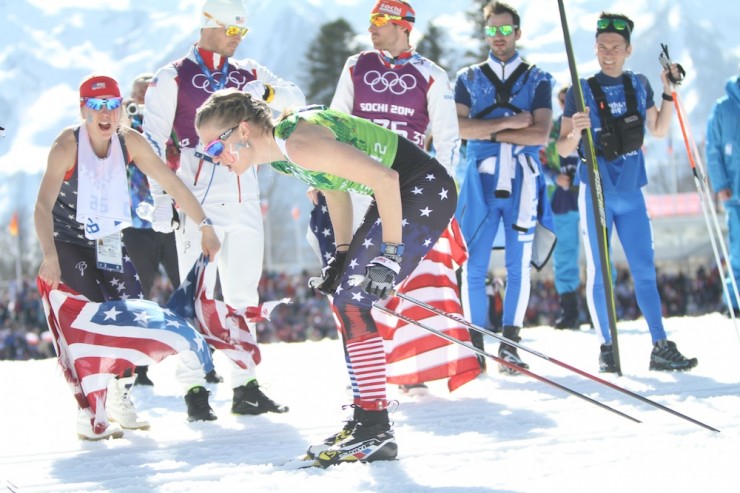
FasterSkier’s coverage is made possible through the generous support of Rudy Project.
SOCHI, Russia — When U.S. women’s coach Matt Whitcomb sat his team down Friday night, he said they talked about executing three things in Saturday’s 4 x 5-kilometer relay. It had nothing to do with tactics, not even the five or so teams battling for a podium in the ultimate team event of the Olympics.
First of all: “Never say die,” Whitcomb said. “Fight until the end.”
Secondly: “Believe in your teammates. Believe in yourselves,” he elaborated. “We can use that fuel better than any team in the world, I believe.”
And finally: “Get your sparkle on.”
“It was all about attitude out there,” he said after the race. “We have two sports psychologists on hand here that are phenomenal, and we’ve hardly used them because the team chemistry and the stability of the team is so great. Such great support from the men, from athletes on a particular day that are considered reserves, from coaches. The psychological aspect of the [team] is not struggling right now.”
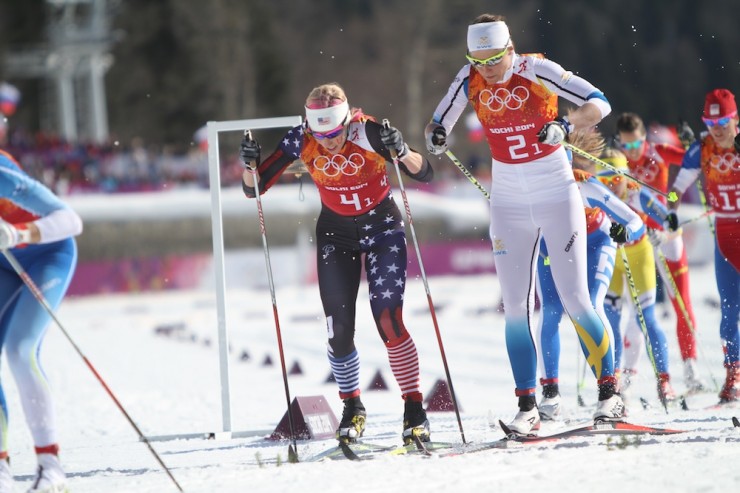
That’s why his eyes welled up at the end of the day. It wasn’t because his team had just placed ninth, 2:30.7 minutes behind Sweden, which notched its first Olympic women’s relay gold since 1960 and first medal since 1968.
It wasn’t because their scramble leg, Kikkan Randall experienced her second-straight off-day of the Sochi Games, going from second up the first climb to fourth by the end of the first 2.5 k lap. She tagged U.S. teammate Sadie Bjornsen in 12th, 39.7 seconds behind Russia’s Julia Ivanova up front.
It’s because they did exactly what Whitcomb expected them to.
“When we nail those three points, any result is going to be good for us,” Whitcomb said. “I’m confident and content with what went down today knowing that we’re not broken. We’re as strong as we’ve ever been, we just didn’t ski fast enough today.”
For Randall, it simply wasn’t her day, he said. The first lap went well as she stayed near the front of the pack and within 0.7 seconds of Ivanova in the lead, but she slipped to 10th over the next two kilometers on a meandering, rolling course.
“The endurance just wasn’t there today,” Whitcomb observed. “Our wax staff did a phenomenal job with skis; we had skis good enough to win today. Unfortunately, the relay acts as sort of an example of how things are going for the team when in reality what it is, is an example of how things went today. Today they did not go well.”
Randall’s coach at Alaska Pacific University, Erik Flora recalled the difference watching Randall on her first and second laps. Initially, she appeared strong and in control. Even through 3 or 3 1/2 k, she looked good, he said.
“As she climbed [on the second lap] I saw the form come apart a little bit,” he said. “Something we’ll have to go back and kind of review a little bit and talk about, but looked like a tough day.”
The timing was perhaps the most unfortunate and uncharacteristic piece of the puzzle for Randall. Three days ago, she didn’t advance past the quarterfinals of a skate sprint for the first time in three years.
“Unfortunately, the relay acts as sort of an example of how things are going for the team when in reality what it is, is an example of how things went today. Today they did not go well.” — Matt Whitcomb, U.S. women’s coach
Randall said she went “deep into the hurt box” and tried to unlock the key for a different result on Saturday, but she couldn’t pull out the performance she was looking for.
“Unfortunately, I kept getting slower and slower at the end,” Randall said. “Ah, shoot, not what I wanted to do today.”
She elaborated, explaining her legs felt flooded with lactic acid. And the conditions didn’t necessarily cause problems; an entirely salted course with firm tracks made for smoother skiing compared to some of the past 55-degree days. On Saturday, it was around 50 degrees on a sunny, almost beach-like afternoon.
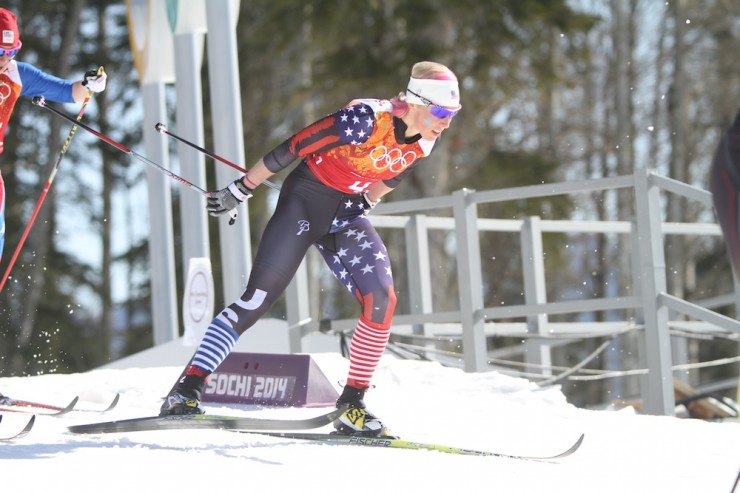
“I had a great first lap. I was staying up front, feeling good and then the pace accelerated on the second lap and I just flooded and I couldn’t keep my tempo up,” Randall said. “That’s where you really start to lose time. I’m kind of at a loss as to why. I had a great workout on the course two days ago and felt totally ready coming into today.”
“I have some work to do to figure out what’s going on but hopefully we can turn it around,” she said.
Whitcomb pointed out that the women have a week until their last Olympic race, and after Saturday’s race, they’ll discuss everything from skis, to fitness, to training with each athlete.
“[We have] room to make some adjustments,” he said. “Some people felt very good out there today and some people didn’t feel very good, so we’ll make small adjustments for some and maybe some large adjustments for others.”
Their second classic skier, Bjornsen picked off three places to bring the team to ninth with the seventh-fastest leg. Remembering her team’s “keep fighting” motto, she tried to chase down Italy and Poland, 18 and 8 seconds ahead of her, respectively.
While Poland rocketed to fourth with Justyna Kowalczyk’s fastest second leg, Bjornsen passed the Czech Republic, Austria and Slovenia. Before the exchange, Bjornsen tucked behind Italy’s Elisa Brocard, handing off to U.S. teammate Liz Stephen 0.7 seconds back from eighth.
“I took off ready to go catch the pack and everybody was reminding me, don’t do it all at the beginning because we’re at altitude, it’s hot out, the courses are tough, and if you do that you’re gonna blow up one kilometer in,” Bjornsen said. “So I tried to just pace it as a 5 k that I would race on my own, and as I saw people I looked up and tried to catch them. I never really saw that front pack, but I pretended I was chasing them the whole time.”
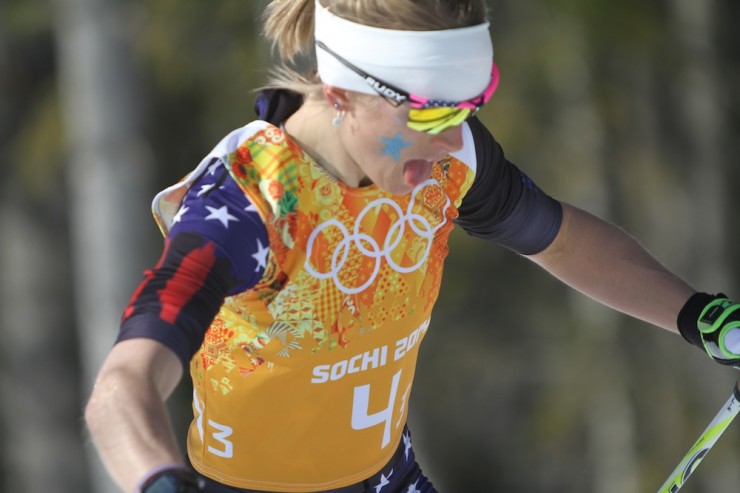
One minute and 5 seconds behind Sweden in the lead, Stephen set out on the first skate leg with Italy’s Marina Piller and the two skied together for the entire two laps.
“My brain was in it the entire time,” Stephen said. “I pretended Italy and I were out for silver and gold and went my hardest.”
Stephen, who did not race on the U.S. women’s 11th-place relay at the 2010 Olympics, held her position in ninth and tagged anchor Jessie Diggins 2 seconds after Italy and 1:34.6 behind Finland up front.
Considering the course, without long, steep hills to suit Stephen and the U.S. team’s skating strengths, Stephen said it was still challenging.
“We were focused on not needing a course that was perfectly built for us, but just to go as hard as we could on the course we had,” she said. “I’m very proud of our team and I can’t believe how lucky I am to be on such a strong women’s team. It might never be as amazing in the next 10 years as it is right now to be a part of this crew. I’m enjoying every second.”
Diggins latched onto Italy’s Ilaria Debertolis and surged ahead of her before the last downhill to the finish. Freeskating her way around the horseshoe-shaped stretch, Diggins looked to have eighth place locked up — but a moment later she found she had made a big mistake.
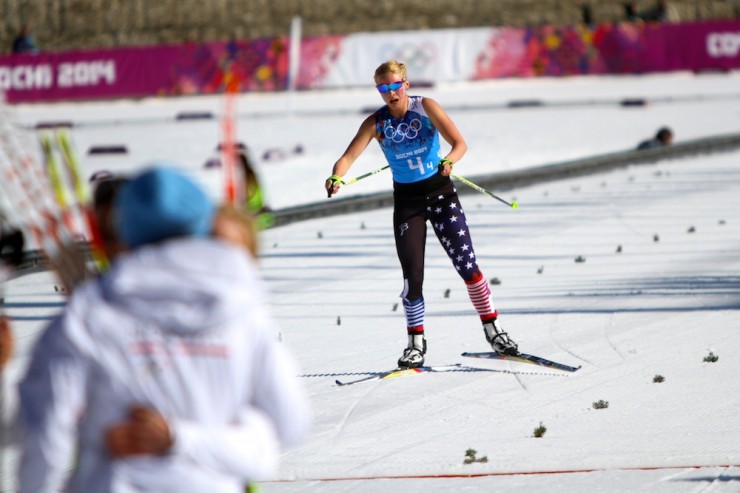
The youngest member of the U.S. women’s team, Diggins, a 22-year-old world team-sprint champion with Randall, skied into the lap lane. As soon as she realized her mistake, she fell, then got back to her feet to backtrack around the v-boards and follow the Italian into the finish.
“Whether or not we were going to be tagged into the medal contention spot or tagged into last place duking it out it was like, all right, I’m going to go out there and give it everything I have, and so that’s what I did,” Diggins said.
“I was basically very, very close to blacking out and took the wrong lane and that was obviously really dumb,” she explained. “I’ll laugh about it later, but it’s good to know that, hey I gave it everything I had. I’m really proud of my teammates. We all skied our hardest and sometimes that means we’re on the podium and sometimes that means we’re near the end of the pack and as long as we gave it everything we had, that’s what matters.”
“Jessie skied a great last leg,” Bjornsen said. “You just have to laugh it off sometimes. Had she been fighting for a medal maybe we would’ve been a little more disappointed … but you know it happens. It’s the Olympic Games and we’re having fun.”
That’s the Sport
Randall’s leg quickly deflated the American cross-country skiers and biathletes who had gathered to watch from the side of the relay trail, waving flags and bedecked in stars-and-stripes headbands, scarves, and gloves.
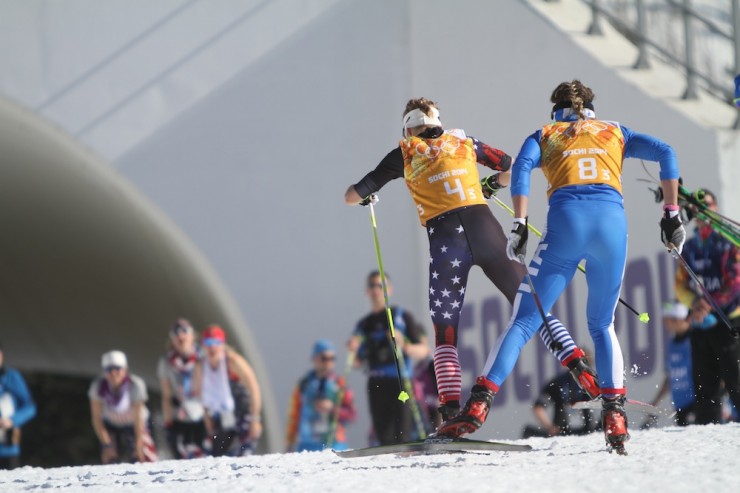
Nervous excitement gave way to disappointment on Randall’s second of two loops, when she failed to appear at the base of a hill with the rest of the pack — prompting one of the American spectators to ask: “Where’s Kikkan?”
“It was really hard to watch. We really tried not to put too much emphasis on medals, but everyone knew we stood a really good chance today,” said Holly Brooks, one of the women on the U.S. team.
Asked to describe the race, it took 15 seconds before Sophie Caldwell and Ida Sargent, two other members of the U.S. team here who watched from the sidelines, could answer the question.
“A little heartbreaking, but they clearly fought each leg,” Caldwell finally said.
“This is one day,” Sargent added.
Flora pointed out that the Americans were not the only ones to struggle on Saturday. The Norwegian team, comprised of the four leaders of the World Cup circuit, collapsed catastrophically, failing to even make the podium.
“Sochi is unique,” he said. “Look at the results.”
Another spectator at the relay was U.S. Ski and Snowboard Association President Bill Marolt, who said he watched from the stadium.
“It’s frustrating, because we do have a good team,” he said. “Sometimes it works, and sometimes it doesn’t.”
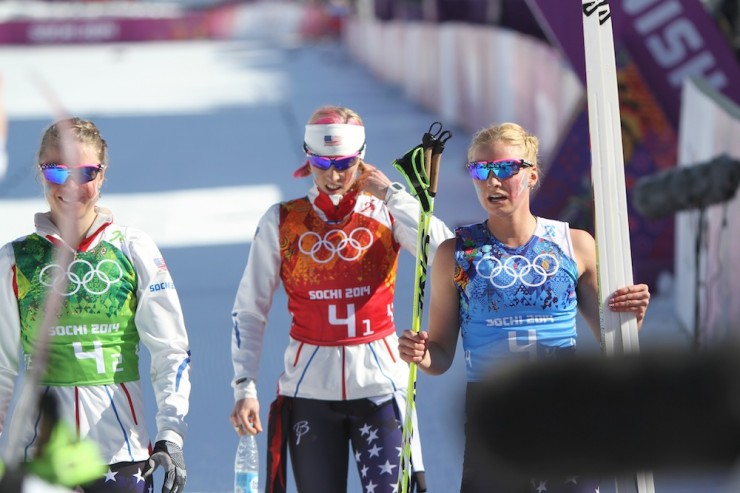
Asked about his reaction to the Americans’ Olympic results, in which a pair of hoped-for medals in the relay and skate sprint failed to materialize, Marolt said that “the way we look at this, we keep our eye on the horizon.”
“We don’t look at the rearview mirror,” he added, though he ended the interview without answering a question about just what the horizon looked like.
The end result on the day may have been disappointing for the U.S., given its medal hopes. But ninth place still represents the best American finish in a women’s relay since 1988, when the team of Dorcas Wonsavage, Leslie Thompson, Nancy Fiddler, and Leslie Bancroft-Krichko finished eighth.
The Americans’ all-time relay best was seventh place, in 1980 and 1984. That record seemed almost certain to fall in Sochi. Now, the U.S. women will have to wait four more years for their next shot to break it, which will come in South Korea in 2018.
In the meantime, the team will have to move on from the Saturday’s frustrating effort, which ended with the American women threading their way through groups of their jubilant opponents as they walked to greet a tearful Diggins at the finish line, two-and-a-half minutes after the winners arrived.
That image, said Brooks, encapsulates the relay race.
“You always have some people crying and some people screaming, and some people carried off because they can’t support their own weight,” she said. “It’s a crazy mixed bag of emotions. But that’s the sport.”
–Chelsea Little contributed reporting
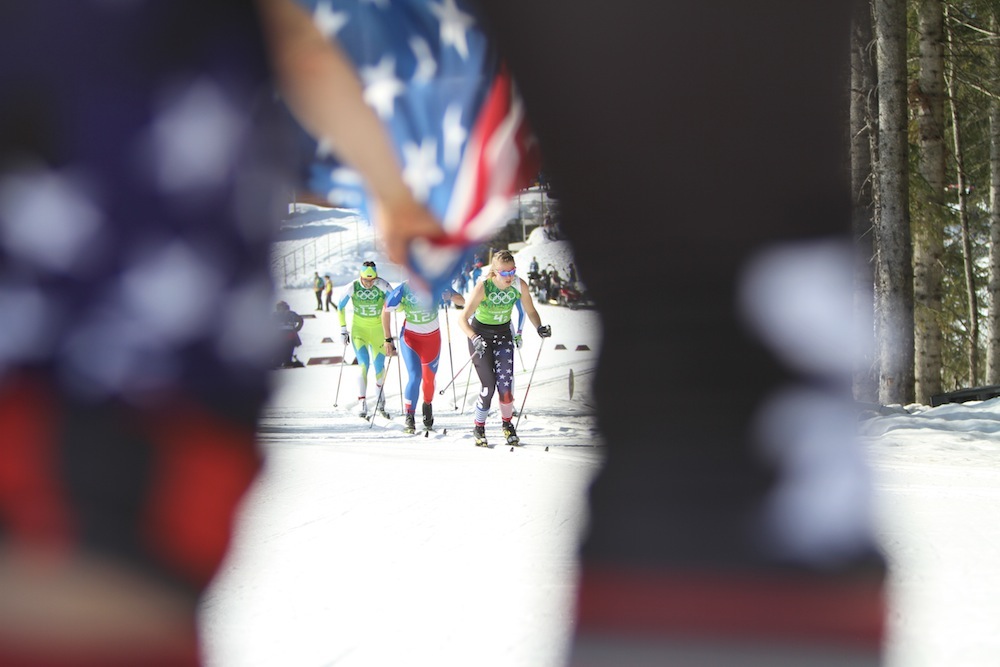
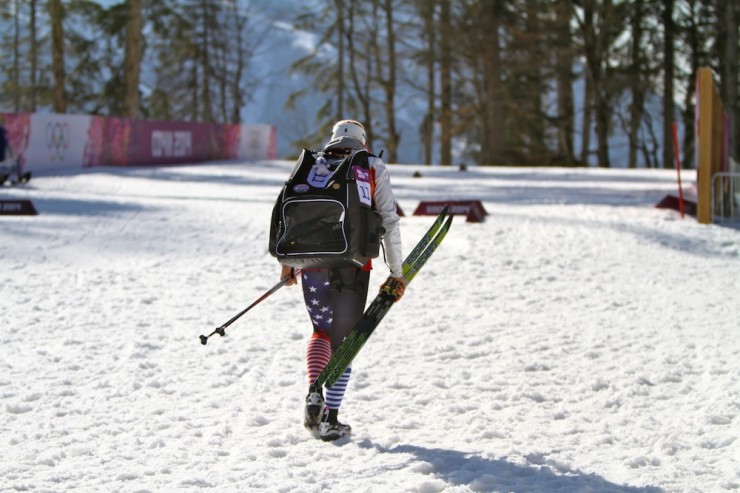
Alex Kochon
Alex Kochon (alexkochon@gmail.com) is a former FasterSkier editor and roving reporter who never really lost touch with the nordic scene. A freelance writer, editor, and outdoor-loving mom of two, she lives in northeastern New York and enjoys adventuring in the Adirondacks. She shares her passion for sports and recreation as the co-founder of "Ride On! Mountain Bike Trail Guide" and a sales and content contributor at Curated.com. When she's not skiing or chasing her kids around, Alex assists authors as a production and marketing coordinator for iPub Global Connection.




12 comments
sully2
February 15, 2014 at 2:47 pm
Disappointing day, and my heart hurts a bit for these women and their coaches and staff who did so many things right. But it is awesome being represented by this group, and I still love this team.
teamepokeedsbyn
February 15, 2014 at 6:28 pm
hey, that’s the relay game – one person has an off day, and can dig too big a hole to get out, that’s ski racing. no biggie, they still have a couple of more chances to show their stuff. think how the Norway gang must feel. that Kalla was pretty amazing, what an animal!
nyctvt
February 15, 2014 at 7:19 pm
Tough break for the women’s relay team. Who now will be doing the team sprint?
highstream
February 15, 2014 at 11:15 pm
I like how the day is “disastrous” for Norway, but only “frustrating” for the U.S., even though they had great skis. Why the difference in expectations? Diggins made a mistake in a final leg – again. When pushing it in distance races, she seems to become raggedy, not just physically which is more or less normal, but also mentally. Hopefully, this will pass soon.
John Forrest Tomlinson
February 16, 2014 at 4:09 am
I was thinking the same thing about Diggins Highstream. It’s great she is willing to go so hard, but this is the second time she’s dropped a place in a relay anchor leg these season due to an error.
leelars
February 16, 2014 at 8:01 pm
Hey highstream and Tomlinson – I’ve got only one thing to say to you: CRAM IT!
John Forrest Tomlinson
February 16, 2014 at 10:09 pm
“I’ve got only one thing to say to you: CRAM IT!”
Why?
cuttsy
February 17, 2014 at 5:33 am
Mr. Tomlinson and Highstream,
I think you guys are being a touch critical. Falling in a relay and costing a place in deep powdery conditions while skating could happen to just about anyone, it’s a bummer of course but doesn’t take anything away from the performance. And skiing into the wrong lane happens, it’s unfortunate but it doesn’t mean that she is not the best choice for our anchor leg. Daniel Rickardsson skied into the wrong lane at Swedish nationals and gave up what would have been a win. So it happens to the best of us. I for one applaud the girls for continuing to fight and try even if they were out of the medal contention.
I think what many of the trolls on the Fasterskier forums need to remember is that we don’t build our system up by being critical and pointing fingers at our athletes, we build it up with support and energy and laughing off the silly things that in the end don’t matter.
John Forrest Tomlinson
February 17, 2014 at 6:09 am
“it doesn’t mean that she is not the best choice for our anchor leg.”
Did either of us say anything like that? You’re reading too much into what we both said. I stated facts. We want her to be even better. I “applauded” her too, writing “It’s great she is willing to go so hard” Highstream said he hopes she improves.
“Daniel Rickardsson skied into the wrong lane at Swedish nationals and gave up what would have been a win”
Yes, and that’s a mistake too.
Measured criticism is a GOOD thing. Ragging all over Diggins or anyone is trolling. Pointing out that she’s made mistakes that cost one place in two races this season is a fact. I’m sure she knows that and her coaches know that. You should recognize it
Being critical all or even most of the time is a bad thing. Being critical sometimes is essential to excellence in sport. .
John Forrest Tomlinson
February 17, 2014 at 6:12 am
Oh, I see Diggins wrote a blog post about the relay and says “That was a pretty dumb move by me, but I can laugh about it now,” So she recognizes the error. That’s a sign or maturity – not ignoring a problem.
skierout
February 17, 2014 at 10:29 am
I have to laugh at the people who think they are offering much needed critique as if no one on the USST can recognize their own weaknesses or mistakes.
If you want to rip on them, take a look at the first picture with Sadie skiing in front of Bird and Newell. Could those guys look more bored or disinterested?
John Forrest Tomlinson
February 17, 2014 at 10:59 am
I have to laugh at someone who thinks saying an athlete made a mistake (n the course of using the word “great” about the same athlete) is “ripping” on them.